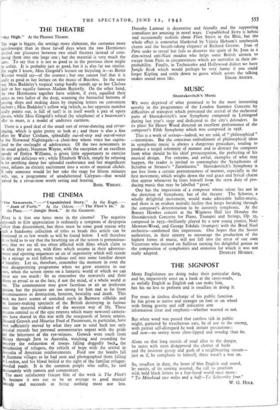ME CINEMA
"The Newsreels."—" Unpublished Story." At the Regal.
" Joan of Paris." At the Odeon. " The Fleet's In." At the Plaza.—" Jungle Book." At the Gaumont.
WHAT is it that one hates most in the cinema? The negative approach to film appreciation is ordinarily a symptom of dyspepsia rather than discernment, but there must be some good reason why such a handsome collection of titles as heads this article can be dismissed in so few words as will be found below. I will therefore be so bold as to say that the besetting sin of the screen is pretentious- ness, that we are all too often afflicted with films which claim to be what they are not, with films which assume in their advertise- ments and opening sequences an air of superiority which will recede like a mirage as reel follows tedious reel into some familiar desert of banality. Let us, therefore, remember the moment in even the most disappointing programme when we grow attentive in our scats, when the screen opens on a fantastic world of which we can never see too much: let us remember the newsreels and their efforts to reveal to us the face, if not the mind, of a whole world at war. The commentator may grow facetious or air an irrelevant opinion but the pictures are too strong for him and as far from pretentiousness as destruction, heroism, bestiality and death. This week we have scenes of scorched earth in Burmese oilfields and the history-making spectacle of the British destroying in furious haste the material evidence of the western way of life. These Pictures remind us of the epic retreats which many newsreel camera- men have shared in this war with the rearguards of heroic armies. Edouard Genock and Maurice Ford of Paramount, in particular, have been sufficiently moved by what they saw to send back not only Pictorial records but personal oommentaries urgent with the pride and the bitterness of the eye-witness. Genock went south from Malaya through Java to Australia, watching and recording for Posterity the exhaustion of troops falling doggedly back,, the mtharkation of refugees, the rebirth of hope with the arrival in ustralia of American reinforcements. Ford saw the bombs fall on Burmese villages as he had seen and photographed them falling Pt London, and his blood boiled at the sight of the familiar refugee- crowded ;oads. It is the common people who suffer, he said Passionately with camera and commentary. The most satisfactory feature film of the week is The Fleet's In, because it sets out to be an average to good musical comedy and succeeds in being nothing more nor less. Dorothy Lamour is decorative and friendly and the supporting comedians are amusing in novel ways. Unpublished Story is heroic and occasionally realistic about Fleet Street in the Blitz, but the whole effect is somewhat blanketed by Valerie Hobson's tomboyish charm and the breath-taking elegance of Richard Greene. pan of Paris seeks to reveal but fails to discover the spirit of St. Joan in a dim-witted anti-Nazi maiden who helps some British airmen to escape from Paris in circumstances which are surrealist in their im- probability. Finally, in Technicolor and Hollywood dialect we have Jungle Book which would perhaps be very funny if you could forget Kipling and settle down to guess which actors the talking


























 Previous page
Previous page